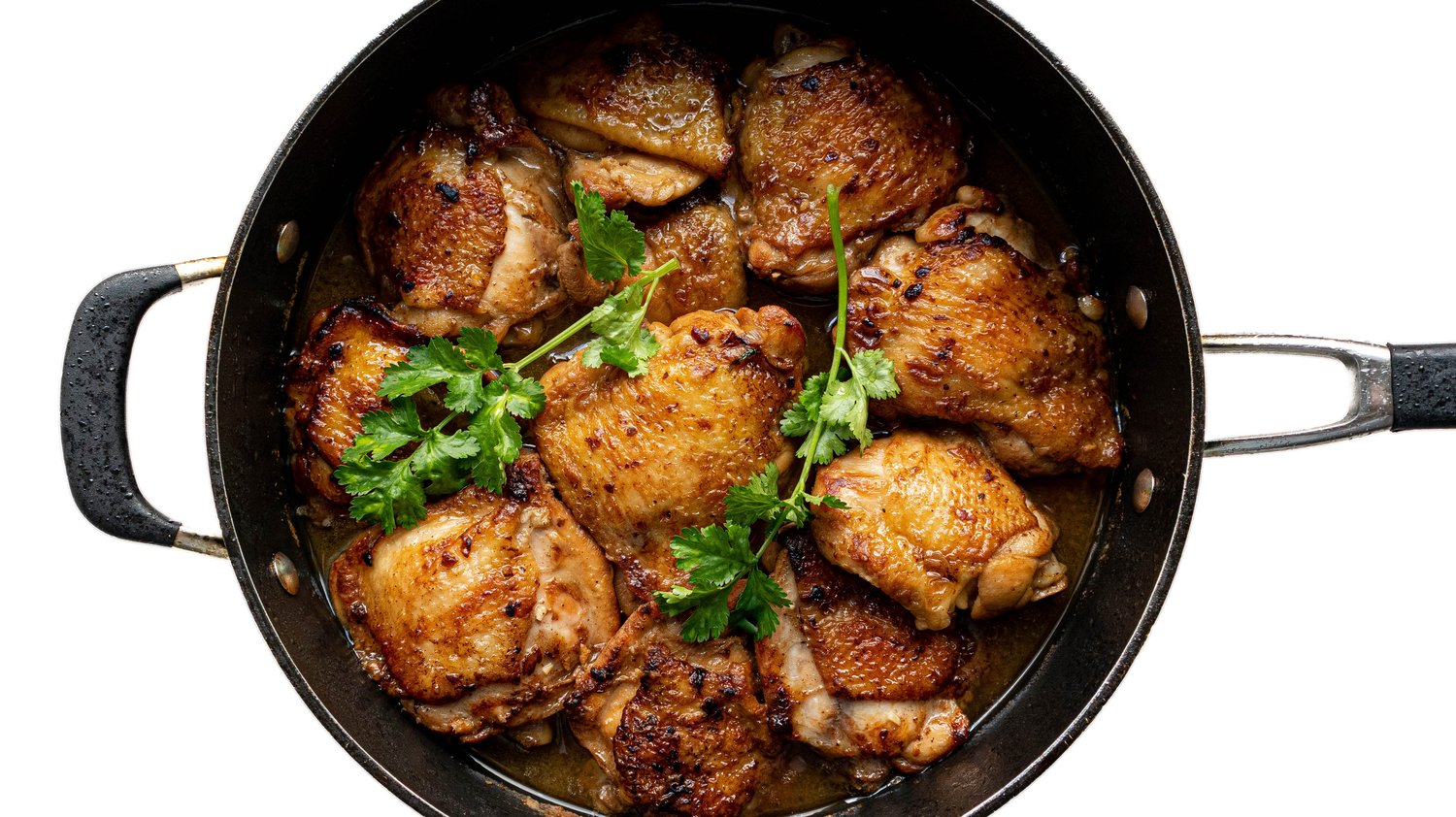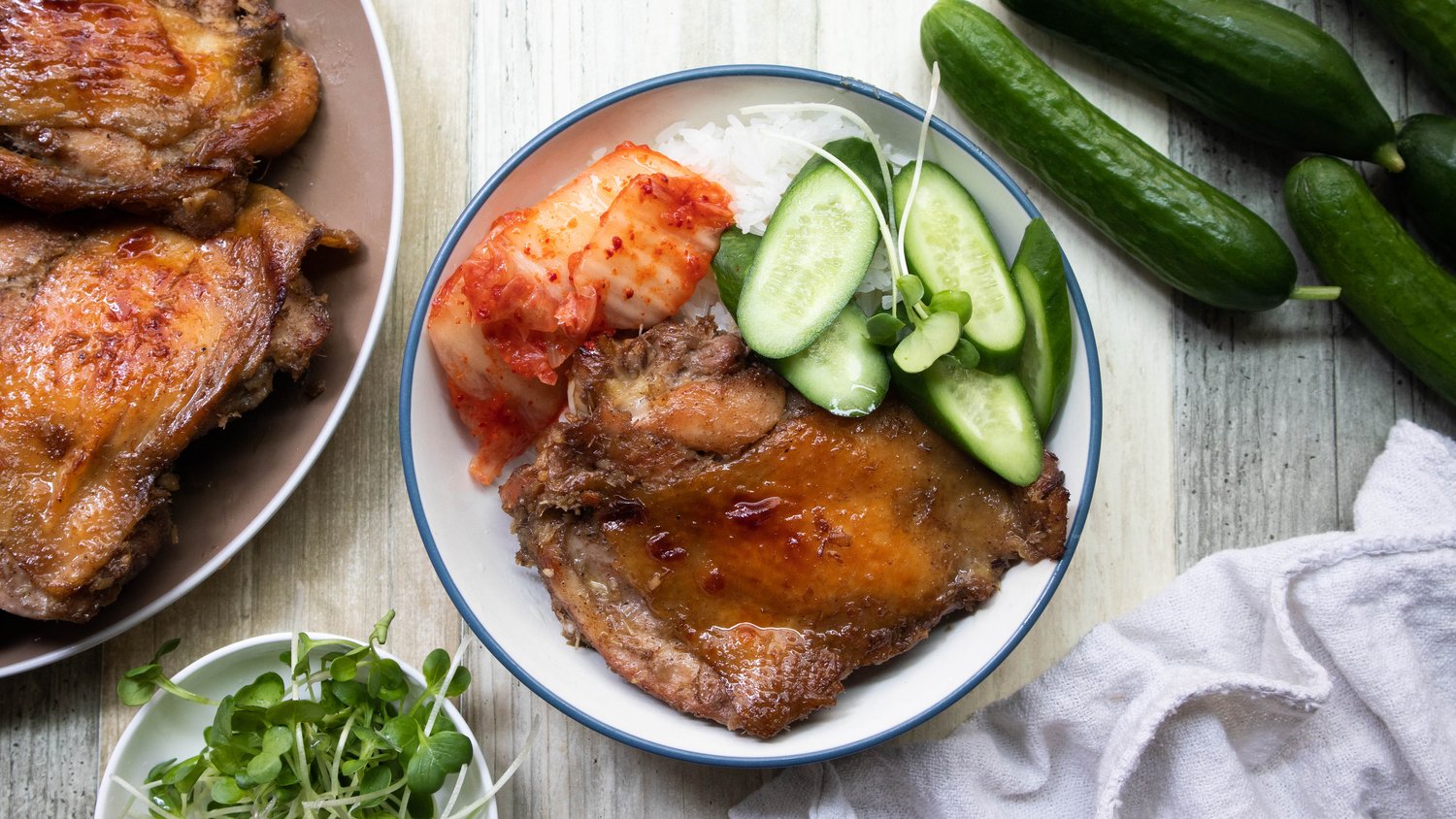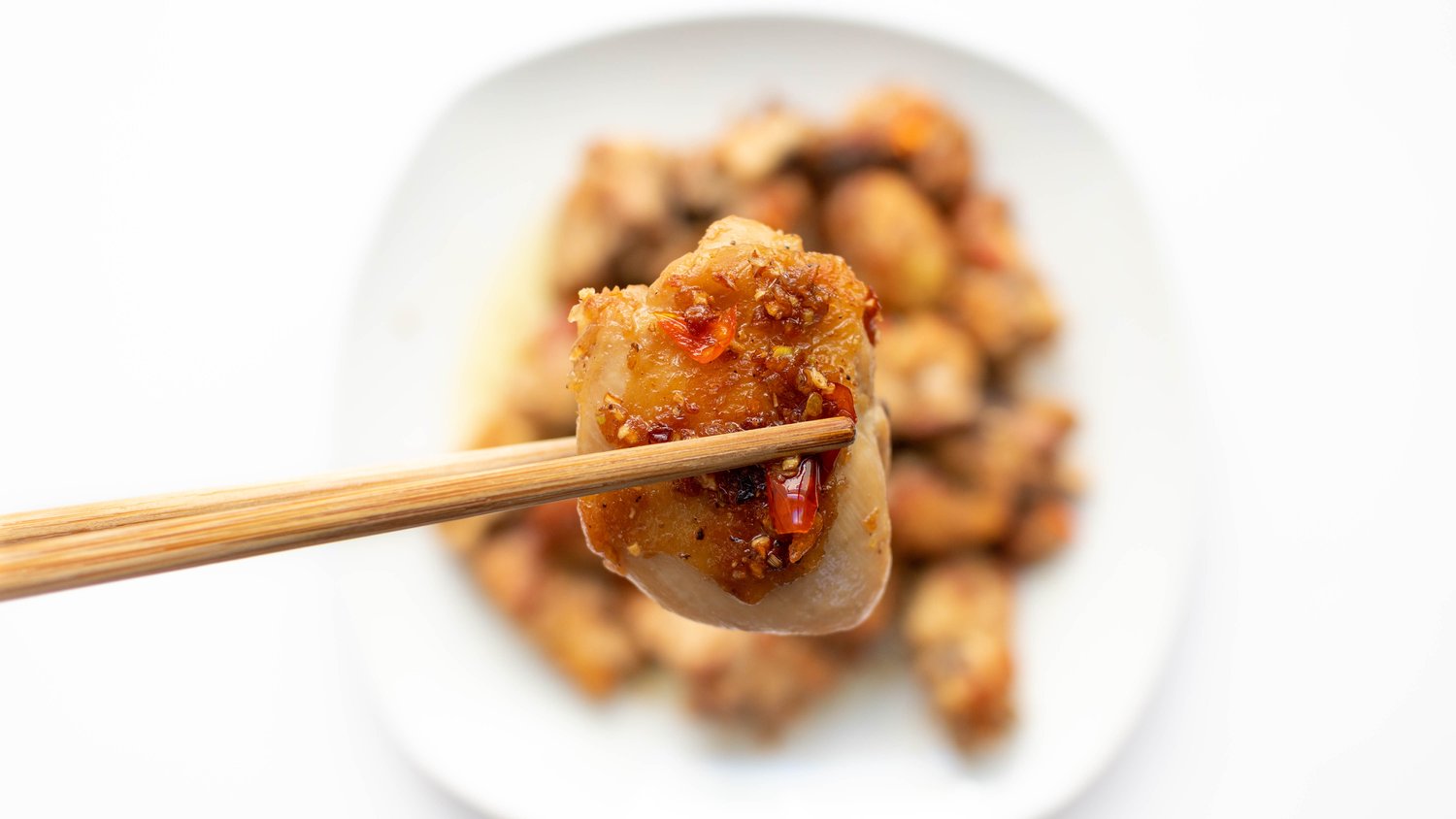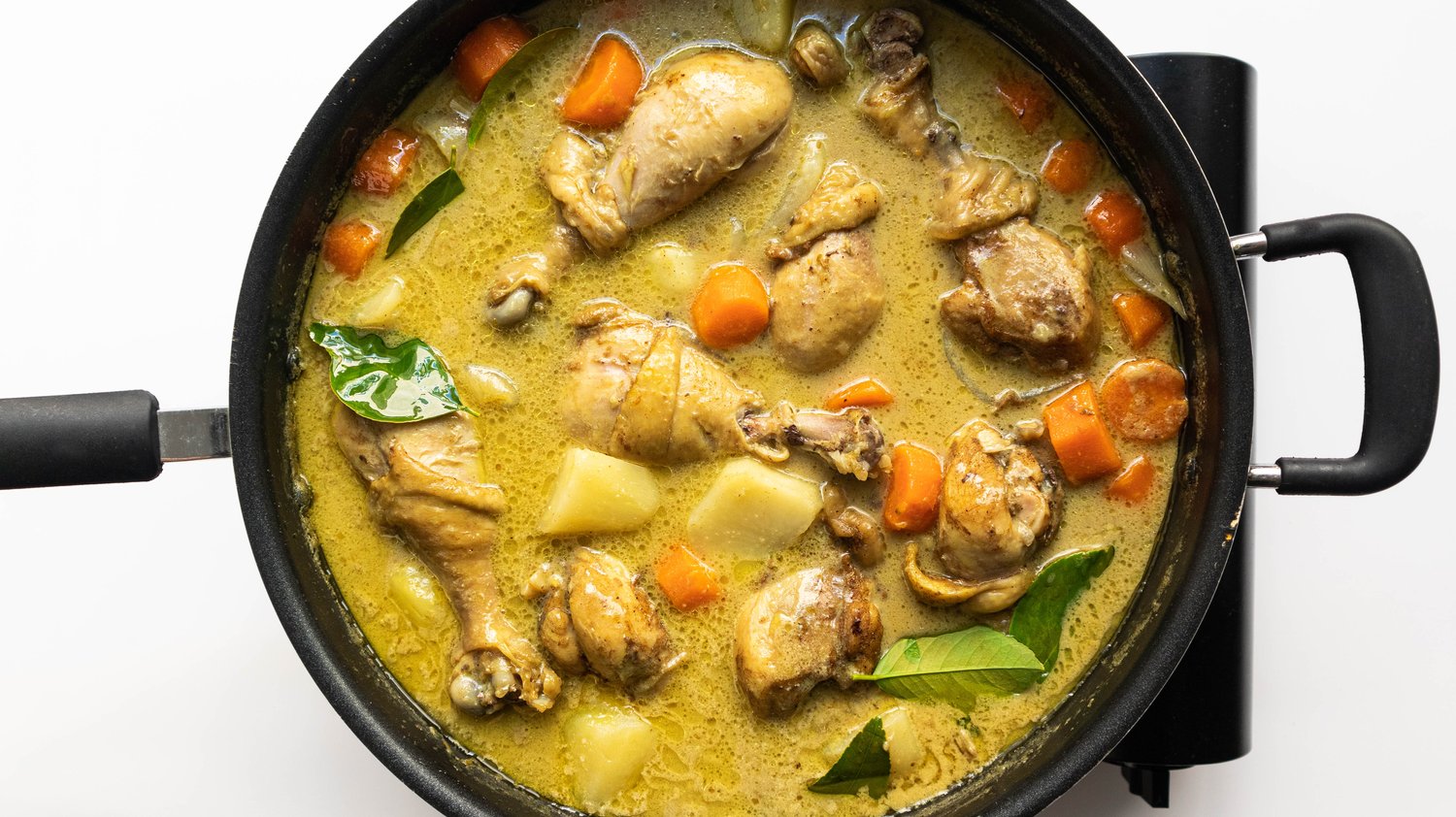
Vietnamese Chicken Porridge (Cháo Gà)
Looking for a dish to cure a bad hangover after a long night out with friends? How about a dish to warm the belly on a cold winter day? Better yet, a dish that will fill the belly when you're overcoming a terrible cold? It’s Cháo Gà to the rescue!
What is Cháo Gà?
Cháo Gà is Vietnamese chicken porridge or congee. It is made with a flavorful chicken broth, topped with hand-shredded tender chicken, a sprinkle of freshly ground black pepper, fried shallots, cilantro, and/or green onions.
For a more authentic taste, serve with a platter of Vietnamese coriander (Rau Răm) and a salt-pepper-and-lime dipping sauce on the side and it’s like you’re back in Vietnam.
Cháo Gà is easy to make and can be customized to your liking by adding your choice of protein. It can be made plain with just rice, salted eggs, century-old eggs (those horrifying unappetizing black eggs that actually taste amazing), regular eggs, chicken, pork, fish, etc. In this recipe, we are making it with chicken.
This is a delicious and comforting dish that’s typically made for someone who is sick, someone who can’t chew (the elderly), or someone who is learning to eat solid foods (babies). Other times, I simply make it to warm the belly on a cold winter day or to enjoy something simple and delicious.

Aromatics for the chicken: Cilantro with its roots, shallots and ginger

Cilantro with its roots, sliced shallots, and ginger
What You Will Need
Chicken — For this particular recipe, I’m making a homemade stock with a whole free-range chicken. However, you can use any kind of chicken that you like or a combination of different chicken cuts.
Free-range chickens are best and the most authentic for this dish. The meat is tighter than your regular American chicken, providing a nice contrasting texture to the smooth porridge.
Rice — To keep it simple, I’m using regular long-grain jasmine rice. It’s the same rice that I use for steamed rice in my rice cooker. You can also use sweet rice, also known as glutinous rice, or broken rice known as Cơm Tấm. Broken rice is great for a more paste-like consistency.
Most Vietnamese households tend to use Thai rice because Vietnamese rice is not available and Thai rice has the closest taste to rice back home in Vietnam.
One of my favorite Thai rice is Sun Lee’s Ông Địa. It’s the brand with the Buddha picture (shirtless, bald, fat man with drooping ear lobes). Another favorite long-grain Thai jasmine rice is Ba Cô Gái (Three Ladies Brand). It’s the bag with three ladies dressed in traditional Thai and Vietnamese clothing on the front.
Both of these brands have regular jasmine rice, sweet rice, and broken rice so just look carefully at the package to see what type of rice you are getting.
Aromatics — I’m using ginger, shallots, and a whole cilantro plant with the roots and all. The roots have great flavor and I have a garden full of cilantro that I need to use up. If you don’t have a whole cilantro plant, simply use a typical grocery-store bunch. You can also replace shallots with yellow onions instead.
Seasonings — To flavor the porridge, I’m using salt, sugar, and chicken bouillon powder. Chicken bouillon powder is the great Southeast Asian cooking cheat. If you don’t have chicken bouillon powder, not a problem. Simply replace with salt.
Garnishes & Vegetables — To make it pretty, garnish with thinly sliced cilantro, and/or green onions. You can use thinly sliced yellow/white onions too. For it to be more authentic, serve Cháo Gà with Vietnamese coriander (Rau Răm) or bean sprouts (Giá).
Dipping Sauce — The dipping sauce is used to dip the chicken pieces. It’s a mixture of lime juice (can use lemon juice too), salt, and ground black pepper. This dipping sauce is a must-have or else the dish is incomplete!

Optional: Pan fry rice grains with rendered chicken fat for a flavor boost

Optional: Transfer boiled chicken to an iced bath to tighten up the skin.
How to Make Cháo Gà
To start, make the stock. Add chicken, ginger, shallots, and cilantro to a large pot and fill it with water. Bring the pot to a boil and cook on a medium-low simmer. Remove the chicken and hand-shred the meat and set aside.
Remove all the aromatics (ginger, shallots, cilantro) from the pot and discard. Add rice and simmer until the rice has broken down into your desired porridge consistency. Season to taste with salt, sugar, and chicken bouillon powder. And that’s it!
Serve the porridge in a bowl, top with some slices of hand-shredded chicken. Garnish with fried shallots, a dash of freshly ground black, and cilantro/green onions. Serve your pipping hot bowl of Cháo Gà with a salt-pepper-lime dipping sauce and optional vegetables.
There are a few added steps that make a world of difference that makes Cháo Gà more authentic but they are not entirely essential. You can skip these steps if you are running short on time or do not have the extra ingredients:
Toasting the rice with rendered chicken fat. Remove some of the fatty part of the chicken and heat it in a skillet to render its fat. Toss uncooked rice with the chicken fat to give it a boost in flavor.
Once you are done making the stock, transfer the boiled chicken to an ice bath. This helps to tighten up the skin for a more better texture.
Coat the chicken with a mixture of turmeric powder and shallot oil. This gives the chicken a beautiful and aromatic yellow shine that we associate with authentic Vietnamese chicken.

Rice, trimmed chicken fat, and stock pot with whole free-range chicken, cilantro, shallots and ginger
Complete the Meal
You can’t have Cháo Gà without its sister dish, Vietnamese Chicken Salad (Gỏi Gà)
Or check out these other authentic Vietnamese salad dishes:
Vietnamese Green Mango Calamari Salad (Goi Xoai Xanh Muc)
Vietnamese Summer Salad with Banana Blossom (Goi Bap Chuoi)
Vietnamese Rice Paper Salad (Banh Trang Tron)
Vietnamese Squid Salad (Goi Muc)
Vietnamese Green Papaya & Beef Jerky Salad (Gỏi Đu Đủ Khô Bò)
Banana Blossom Salad Recipe (Goi Bap Chuoi)
Vietnamese Young Jackfruit & Shrimp Salad (Goi Mit Non Tom)
Vietnamese Shrimp Salad (Goi Tom)
 Yield 4Author Vicky PhamPrep time5 MinCook time1 HourTotal time1 H & 5 M
Yield 4Author Vicky PhamPrep time5 MinCook time1 HourTotal time1 H & 5 MVietnamese Chicken Porridge (Cháo Gà)
A delicious and comforting dish, Vietnamese chicken porridge is typically made for someone who is sick, someone who can’t chew (the elderly), someone who is learning to eat solid foods (babies), or simply for someone who wants good food to warm the belly on a cold winter day.Ingredients
PorridgeInstructions
- Chicken the chicken by rubbing it down with a tablespoon of coarse sea salt on the skin and the inside of the chicken. Rinse with water then drain dry. With a knife and a cutting board, remove the toenails from the chicken, if any. Tuck the legs into the chicken cavity as they tend to stick out from the water in the pot. Trim off the fatty parts of the chicken and set aside. The chicken fat will be used to toast the rice.
- In a large pot, add chicken, shallots, ginger, and cilantro. Add water (3 quarts) and bring the pot to a boil. Reduce the heat to a low simmer and cook for 30 minutes. Check for doneness by piercing between the joint of the thigh and body. If the liquid is clear and not pink, chicken is done. Remove all the aromatics and discard. Remove the chicken and transfer it to an ice bath for 3 minutes. This step helps to tighten up the skin but is optional. Remove from the ice bath. In a small bowl, mix together the shallot oil and turmeric powder. Rub this mixture onto the chicken. This will create the iconic yellow color with a great aroma and the oil will keep the chicken from trying out. Hand-shred into thin strips then set aside.
- Rinse the rice in a fine-mesh sieve under cold running water in the sink until the water runs clear. Drain dry. In a medium pan, add chicken fat and heat on medium-high until you render about 1 tablespoon of chicken oil. You can also use shallot oil if you don't have enough oil. Add rinsed rice and toss in the chicken fat until lightly toasted (about 5 minutes). Add rice to the pot and discard the chicken fat. Cook for 30 minutes on a medium-low simmer or until the rice has broken down into your desired porridge consistency. Make sure to stir the bottom so that it doesn’t burn. Season the porridge with salt, sugar, and chicken bouillon powder to taste.
- Make the dipping sauce by mixing together lime juice, salt, and ground black pepper.
- Ladle porridge into individual bowls. Top with slices of hand-shredded chicken. Garnish it with fried shallots, a dash of freshly ground black pepper, and thinly sliced cilantro/green onions. Serve with a side of Vietnamese coriander (Rau Răm) and bean sprouts (optional).
Notes
If you are running short on time, you can skip three steps (1) rendering the chicken fat and toasting the rice, (2) transferring the boiled chicken to an ice bath, and (3) rubbing the oil and turmeric powder onto the chicken.
If there are innards (it’s typically stuffed inside the chicken), make sure to clean those off with a good salt rub and cook them too. They are delicious!
Nutrition Facts
Calories
654Fat
33Sat. Fat
9Carbs
47Fiber
2Net carbs
45Sugar
5Protein
40Sodium
2801Cholesterol
143The values provided should be considered estimates. Factors such as brands purchased, natural variations in fresh ingredients, etc. will change the nutritional information in any recipe. To obtain accurate nutritional information for a recipe, use your preferred nutrition calculator to determine nutritional information with the actual ingredients and quantities used.
Similar Recipes

Vietnamese Braised Coconut Chicken (Ga Rim Nuoc Dua)

Vietnamese Five Spice Chicken (Ga Nuong Ngu Vi Huong)

Easy Vietnamese Pan-Fried Spicy Lemongrass Chicken (Ga Chien Sa Ot)


